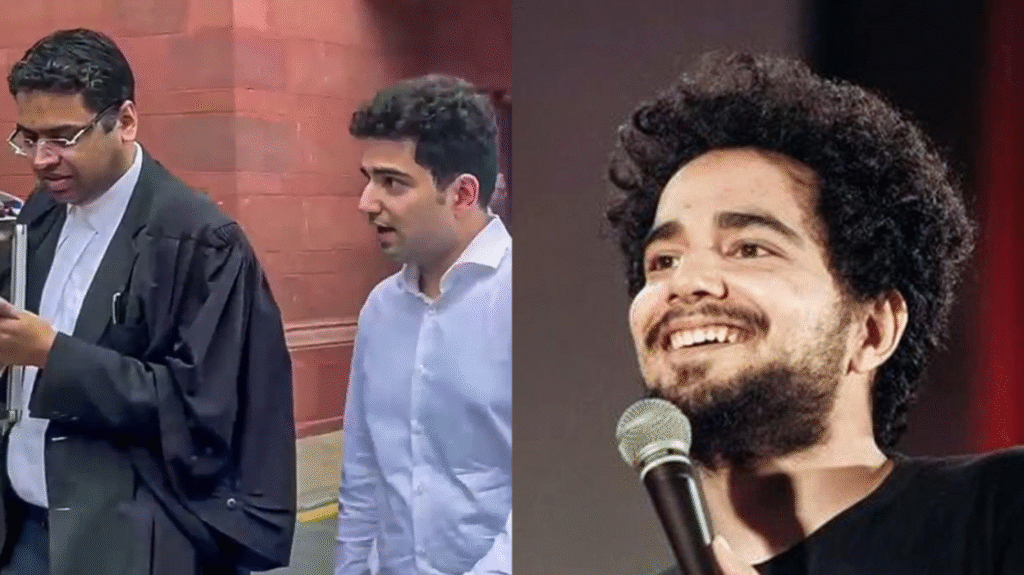Comedian Samay Raina, known for hosting the YouTube reality show India’s Got Latent, is facing a series of legal setbacks following allegedly offensive remarks. From sexist and ableist jokes to hurtful commentary on rare diseases, Raina is now under scrutiny by both the Supreme Court and the National Commission for Women (NCW)—a stark reminder that freedom of speech isn’t absolute.
⚠️ Supreme Court Flags Offensive Disability Jokes
On July 15, 2025, the Supreme Court of India, through Justices Surya Kant and Joymalya Bagchi, described Raina’s jokes on people with Spinal Muscular Atrophy (SMA) and visual impairment as “disturbing”. This followed a PIL filed by the CURE SMA Foundation, which demanded action on derogatory content targeting persons with disabilities.
Samay Raina, along with four fellow influencers, was summoned to submit formal replies within two weeks. The court emphasized that mocking vulnerable communities under the guise of humor could amount to hate speech, which falls outside protected free speech. Authorities were also prompted to consider framing guidelines governing online content and influencer accountability.
This is not a first—in May 2025, the Supreme Court had already summoned Raina and others over similar allegations of mocking a child with SMA.
👩 NCW Summons & the Written Apology
In parallel to disability remarks, Raina also faced backlash for sexist comments on India’s Got Latent. The National Commission for Women summoned him on July 15, to appear before Chairperson Vijaya Rahatkar. Raina submitted a written apology, expressing regret and pledging to maintain “the highest respect and sensitivity” towards women in future content. The NCW emphasized the need for public figures to uphold women’s dignity and work towards promoting gender equality.
📺 The Fallout: Show Removed, Apologies Made, But Can It Save His Reputation?
India’s Got Latent, which premiered in mid-2024, was abruptly taken offline in February 2025, after explosive controversy erupted during an episode featuring Ranveer Allahbadia . Samay Raina removed all episodes, citing the intent to “make people laugh” but acknowledging that some content crossed the line.
Despite the removal, the damage was done—FIRs were filed in Mumbai and Guwahati, and parliamentary debates and NCW involvement followed.
⚖️ Legal & Ethical Implications: A Turning Point for Digital Content
In just a few months, Samay Raina found himself at the intersection of multiple legal forums:
- Supreme Court: Scrutiny on hate speech and disability mockery
- NCW: Investigation into sexist content and its public harm
- Cyber-police: FIRs for vulgarity and indecency
These cases bolster court warnings that free speech demands responsibility, particularly in a polarized digital landscape.
🧭 What Lies Ahead for Samay Raina & Other Creators?
- Supreme Court Response
Raina and co-influencers must file replies within two weeks. If found guilty of hateful remarks, they could face punitive action. - NCW Oversight
The NCW may direct Raina to adhere to its standards; further hearings or public statements could follow. - Policy-Level Shifts
The Supreme Court has called for new guidelines to regulate online and OTT content, balancing freedom with dignity. - Public & Platform Accountability
Samay Raina’s case has sparked conversations about platform responsibility, audience influence, and self-regulation in digital media.
✍️ Final Reflection: Where Comedy Meets Accountability
The Samay Raina controversy is a watershed moment. It underscores the growing tension between comedic liberty and societal respect. While satire and edgy humor have always held a place in entertainment, today’s regulatory mechanisms remind creators that digital platforms carry real-world consequences.
This saga stands as a precedent—not just for Raina, but for all content creators—on the importance of sensitivity, empathy, and responsibility. As India’s courts and commissions debate the boundaries of humor, one thing remains clear: Laughs should never come at the cost of dignity.
To read more Indian Laws and news, visit Legal Guide India



